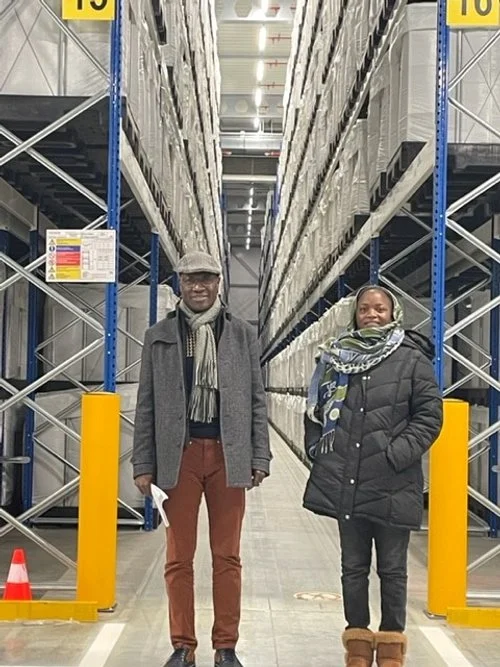ISSD Sahel Director visits stakeholders from Dutch seed sector
Dr Fofana Bidjokazo is the director of the Integrated Seed Sector Development (ISSD) Sahel programme at IFDC in Bamako/Mali. On February 22-24, he visited the Netherlands to meet several stakeholders part of the Dutch potato and vegetable seed sector. It was his first visit to the Netherlands. The purpose of the visit was to foster linkages between the Sahelian and Dutch seed sectors for mutual benefit, which is one of the objectives of the ISSD Sahel programme.
Dr Bidjokazo, by origin is a soil scientist, has numerous years of expertise in setting up and managing programmes that support community-based seed production and marketing. This visit to the Netherlands allowed him to learn about the globally oriented seed companies. Moreover, the Netherlands is a global frontrunner in potato and vegetable seed, which are also important for nutrition and food security in the Sahel.
During this three-day trip, the delegation of Dr Fofana accompanied by the ISSD Sahel team of KIT (Royal Tropical Institute) and Wageningen University & Research, visited several stakeholders part of the Dutch Seed Diamond, including members of the SeedNL Sounding Board. In Amsterdam, the delegation met with several teams of KIT. In Wageningen, the delegation interacted with the seed team of Wageningen Centre for Development Innovation (WCDI) and members of Wageningen Plant Research. Both have a strong and international track record promoting improved vegetable varieties and good agricultural practices. The team also met the former leadership of ISSD Uganda to exchange experiences.
The delegation visited five seed companies: Bakker Brothers Seeds, Bejo, East-West Seed, Pop Vriend Seeds and Solynta. These companies are either active in the Sahel region or have expressed their interest to launch activities in the future. Moreover, the companies represent the heterogenous character of the Dutch private sector applying different business models and focusing on different market segments.
Two key goals of the visit were realised. The chief of party was able to personally visit Dutch companies interested in seed partnerships. The ISSD Sahel programme has a small grant scheme in which the companies, on behalf of their local distributor, can apply for financial and technical support for single-source demonstrations and field days during various season in Mali and/or Niger. ISSD Sahel will select proposal with score high in terms of innovation, thus starting new types of activities moving beyond standard practice. These seed partnerships should contribute to transformation of the seed sector in the Sahel.
Secondly, ISSD Sahel received input for the planned assessment of local seed companies. This assessment will result in an open-source registry with information regarding the capacity of seed companies and distributors. It will enable (Dutch) seed companies to identify preferred local business partners for distribution. ISSD Sahel has the target to realise 10 business deals between Sahelian and Dutch companies. These partnerships will be mutually beneficial: Sahelian companies benefit from capacity building, while Dutch actors are able to tap into a local network. Together, partners will work business development. As result, local farmers will benefit from enlarged seed diversity: choosing their preferred vegetable and potato variety.
Dr Bidjokazo was impressed with the expertise of the Dutch stakeholders. He appreciated the truly global nature of Dutch seed companies in terms of their R&D, seed production chains, and marketing. Also, he appreciated the long-term vision and willingness to invest in local seed sector development in emerging markets. The visit has sparked enthusiasm to work with the Dutch vegetable and potato sector paving the way for future collaboration.
Meanwhile, the programme’s baseline assessment is almost concluded and implementation of ISSD Sahel is has started. KIT and WCDI are working on the national seed road maps. The IFDC teams in both Bamako and Niamey have started to incentivize seed companies and are conducting an assessment of the national seed trade associations in each country. The seed road map for Niger is currently being reviewed, and the road map for Mali is expected in a couple of months.



